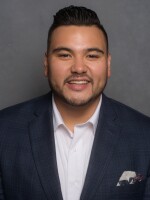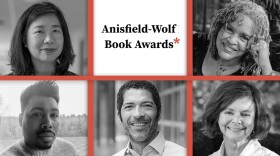"Do you think you need your pain in order to write?"
In his poetry collection, 2023 Anisfield-Wolf Book Award winner Saeed Jones describes in detail how much he disliked being asked that question by an audience member at a reading.
I thought about that when I was at the author's chic apartment in the Short North area of Columbus to conduct an interview for a documentary on him and his fellow winners.
Do I go for it? Should I ask it?
After we'd set up the cameras and lights, I went for it. With the first question: "Do you think you need your pain in order to write?"
Thankfully, he burst into laughter instead of tossing me out.
My interview with Jones was one of many I had the privilege of conducting as I produced an Ideastream Public Media documentary about the Anisfield-Wolf Book Awards for the last two years. It's the only book prize in the country that focuses on work that address racism and diversity, and it's a Cleveland gem.
I've had a blast getting to know the winning authors and profiling them. The most recent documentary, "The 88th Annual Anisfield-Wolf Book Awards," will air on PBS stations across the country. Locally, you can watch it on WVIZ-PBS on Jan. 15 at 10 p.m. I hope you get a chance to check it out. It’s hosted by Harvard professor and PBS’ “Finding Your Roots” host Henry Louis Gates Jr.
The conversations I had with each author felt like chatting over a beer with a friend, but instead of talking about current events and last week’s Browns game, we talked about the themes and storylines from their work.
These were my favorite topics from each author.
“Alive at the End of World” by Saeed Jones

Saeed Jones is the winner for poetry. “Alive at the End of the World” expresses the internal conflict felt by a queer Black man in America — a feeling of being simultaneously celebrated and tortured.
To say Jones fills a room with energy is putting it lightly. His laugh is contagious and his movements are theatric. He was most energetic when he talked about cultural appropriation.
Jones discussed the work of Black rock stars who got little credit for their songwriting and style compared to white musicians who covered those songs and tried replicating their trends.
“One of the many ways to die a death in American before dying is to have people applaud for you as they’re stealing from you,” Jones said. “That’s what cultural appropriation really is about.”
“The Family Chao” by Lan Samantha Chang

Lan Samantha Chang is one of two winners for fiction. “The Family Chao” is a murder mystery set in the Chao family’s Chinese restaurant. The family members are as unique and individual as the delicacies at the restaurant. That complex individuality gets lost on their small-town Wisconsin neighbors.
Like the main characters in the book — and like myself — Chang grew up as one of few Asian Americans in a predominately-white Midwest town. Exchanging stories of that experience made her feel like an old friend.
We discussed her background, the character and the plot. But when a book is set in a restaurant, you must also talk about the food. Chang’s descriptions of juicy pork dishes and steaming dumplings left me yearning for the fridge between chapters.
“One of the interesting things that I discovered while writing this book is that people’s feelings about their Chinese-Americanness and their Chineseness can be seen in how they relate to and adapt to the food around them,” Chang said.
“Half American” by Matthew F. Delmont

Matthew F. Delmont is the nonfiction winner. “Half American” is a deep dive into the mostly forgotten histories of Black Americans who were involved in World War II.
“Half American” not only shows us that Black Americans were heavily involved in World War II through combat and supply, it uncovers the fact that Black Americans were vital to American victory.
Delmont knows these histories up and down. And while he gets and excited as he talks about his research, he lights up even more when he tells you about his family.
Even when he describes something as mundane as cooking dinner or doing laundry for his kids, he smiles big. That makes it easy to appreciate what he's saying when he talks about the importance of passing our histories down to the generations after us.
“In terms of parents who might be worried about children learning about race or racism at too early an age, for people who have children of color, it’s unavoidable,” Delmont said. “I think that’s part of what it means to be a citizen in a multiracial democracy.”
“Horse” by Geraldine Brooks

While Geraldine Brooks is the other winner for fiction, “Horse” leans on the story a very real 19th century racehorse, one of the most dominant racehorses in the history of racing.
“Horse” pays homage to the enslaved Black people — grooms and jockeys — most responsible for the horse’s success.
Brooks is horse obsessed. Her words, not mine. It was fun meeting her pet horse, Valentine.
Brooks is aware of the criticism she’s received being a white woman writing about Black lives. She responded by embracing the criticism and doubling down on her allyship.
“I don’t have to tell a Black person about the evils of slavery or the entrenchment of modern racism. They know it. They live it. My readers may be, a lot of them, privileged middle-aged white women like myself. Maybe they haven’t had a chance to delve deeply into this history,” Brooks said. “That’s what I can do. I can stand and speak to people who can hear me.”
Lifetime Achievement Award Winner Charlayne Hunter-Gault
Charlayne-Hunter Gault’s name is easy to recognize through bylines and television and radio appearances. A longtime journalist with a resume that includes CNN, the New York Times and PBS, she told the stories of Black people around the globe that so many news organizations failed to tell.
Alongside her high school classmate Hamilton Holmes, Hunter-Gault desegregated the University of Georgia and the two became the first Black graduates of the school in 1963.
Being journalists, we admire the news-greats who came before us. Meeting Hunter-Gault was like meeting the Rolling Stones or Beyonce. As much as I enjoyed hearing about her lifelong reporting goals and all the big names she interviewed over the years, I was even more in awe hearing her tell the story of walking onto the University of Georgia campus for the first time.
Hunter-Gault is too modest to say it herself, but she is an icon and a history maker.
She was met with slurs and taunts as a UGA student, but a crown she was awarded as a young teenager reminded of her own royalty, which helped diminish any hate hurled her way.
“The notion that I was a queen took up residence in my head,” Hunter-Gault said. “When I walked onto the campus of the University of Georgia and the students were yelling ‘the n-word go home,’ I was looking around for who they were talking about, because I knew who I was. I was a queen.”
She told this story to me and Ideastream producer Natalia Garcia as we walked to her daughter’s art show on Martha’s Vineyard. Before wrapping up she talked about a gift she gave herself for her 81st birthday. She then rolled up her left sleeve and showed us the crown tattooed on her shoulder.
Iconic.
I hope you enjoy getting to know these literary greats as much as I did.









